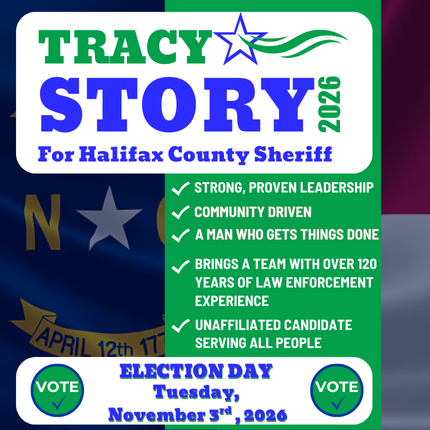A Roanoke Rapids man who complained about the lack of transparency within the city’s government said during the public comment section of Tuesday’s city council meeting he will run for a District 2 seat when one opens.
That would pit Ephraim Brodsky against Andy Jackson, whose term expires this year after he was appointed last September to fill the unexpired term of Wayne Smith, who stepped down for health reasons.
The comments made by Brodsky, who lives in Jackson’s district, came near the end of his discussion with the council about a matter which he said occurred at his son’s elementary school involving what he claimed was a mean officer and the need for a civilian complaint review board like in his native New York.
“Recently we had an event at my son’s school (Manning) and an off-duty Roanoke Rapids police officer came and was more than mean to the children,” Brodsky said, explaining the matter occurred a few months ago. “The cafeteria workers were then threatening children that they were going to bring a mean police officer back if they acted up.”
Then, Brodsky charged, about two weeks ago the officer came back when the regular school resource officer was off that day. “My children came home devastated and they were telling me that two dozen were crying, that the officer had raised his voice and said, ‘I’m getting angry and you don’t want to see me when I’m angry.’ And, yes, this was in the school. It wasn’t at the police department. But this was a Roanoke Rapids off-duty police department officer in his off-duty capacity working at the school with a gun and a badge representing the city of Roanoke Rapids.”
The review board
He said the civilian complaint review board is available so if anyone wants to make a complaint, they can launch one and fill out the paperwork. “The civilian complaint review board is required to review the complaint and let the people know how it was adjudicated.”
Brodsky said when the alleged matter occurred at Manning his children came home very upset. “My older child told me he was crying. My younger child told me that many children in his class … were also crying.”
That’s when he went to Councilman Rex Stainback, a former veteran police officer within the department who is also his father-in-law, which he did not disclose to the council during his talk. “He told me he would take care of it. The next day he went to the police department and several parents had already complained and they decided this officer is not going to be allowed back at the school and that was supposed to be the end of it.”
Brodsky said, however, “For me that’s not enough. The same way that the city council comes and commends police officers for exemplary duties, I’d like us to know what happens to these officers that don’t do the right thing. I’d like there to be some kind of process in place where we could air our grievances and hear what was the discipline. Hopefully with the new chief here something like that can be put in place so concerned citizens can air their grievances.”
‘Quote-unquote elected officials’
Following those comments, Brodsky began his discussion about a run for city council. “Honestly, I look at everybody in front of me and out of all of the quote-unquote elected officials, three of you ran unopposed, two of you were appointed. There’s actually only one official here that actually ran with any opposition. Less than 30 percent of the voting population voted at the last election so this isn’t civic engagement. This is voter indifference. The people don’t think that their vote matters and the reason they don’t think their vote matters is because there’s no transparency in the system.”
Brodsky, who left immediately after his talk, told the council, “I’ll start coming back. I’ll come to every meeting and I’ll air logical grievances because I have a lot of them … Nobody seems to want to listen to logic because in a small town everybody’s connected, everybody’s in business with each other and what one person says could impact a lot of people. So I’m here to say it ends now. I’m going to run for city council when a council 2 seat opens and hopefully one person can make a difference.”
Jackson said following the meeting, “I understand his concerns. I had to raise children and I would have the same concern.”
Asked about Brodsky’s intention to run, he said, “That’s fine. That’s what America and democracy is about.”
City attorney comments
City Attorney Geoffrey Davis said following the meeting, “Anytime there’s a complaint against a city employee council really isn’t the best place to address it. The city council doesn’t have hiring and firing authority over city employees. That’s specifically given to the city manager. There’s a provision in our city ordinances and our personnel policy for citizens to file grievances. That’s the proper way. If you have an issue, you file the grievance and you follow through it appropriately.”
Davis said he realizes it’s frustrating for the public sometimes when they have an issue with, for instance, a city employee to never get an answer as far as how it’s addressed. “The reason a lot of times why we can’t is because that employee has (by state statute) privacy rights. North Carolina General Statute is very limited in what we can release. I think the time where that got kind of addressed in public discussion so much — the last time in the city that I can recall — was in the police firings from two or three years ago. Just like in that situation as far as city employees you can release information about what position they’re in, how much they’re paid, what their demographic information is.”
The city can also release whether they’ve received promotions or demotions “but you can’t talk about the reasons for that. The only time you can give a reason for a disciplinary action is in a situation where an employee is terminated. When they are specifically dismissed from employment, the letter of their dismissal becomes public record. Otherwise, you can’t release any of that information.”
Davis reiterated he realizes there is frustration. “Whether you’re a public employee or whether you’re employed by a private company, I think an employee would want the comfort of not having their business put out there. Regardless, that’s the law as we get it from the legislature.”
The role of officers
Asked if he could confirm if this situation Brodsky referenced happened as he said it did, Davis said, “I don’t know. That’s not my area.”
What he did say, however, is that, “City police officers in any capacity, whether they’re our school resource officers, whether they’re on duty with the Roanoke Rapids Police Department or whether they’re off-duty, you can’t use your show of authority in essentially what are disciplinary situations. One of the things when you have school resource officers that are provided by a municipality is those agreements and those memorandums of understanding would have specific stipulations in there that the employee can’t be involved in school discipline.
“A law enforcement officer, even though we look to them as agents of authority, their real function is to enforce criminal laws of the state of North Carolina. There are so many instances, especially in a school context, where it may be something that calls for some kind of discipline, but there’s nothing criminal going on. I think it’s important for any law enforcement officers who find themselves in those sorts of situations to be mindful of that kind of friction.”
Said Davis: “If this did occur, I think it’s good to put that issue out at the fore and let folks know and put that in the minds of officers moving forward.”
City Manager Kelly Traynham said she couldn’t comment because it’s a personnel matter.






